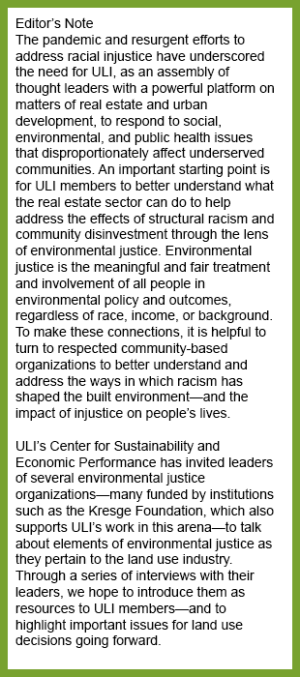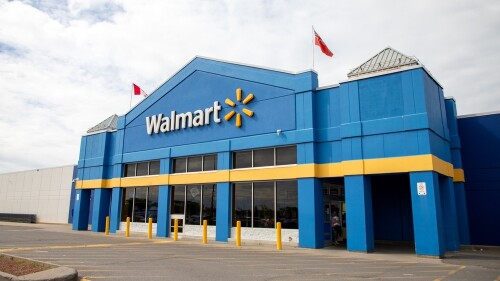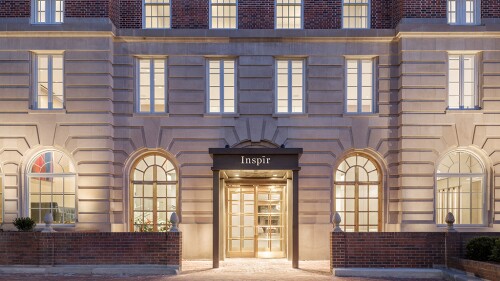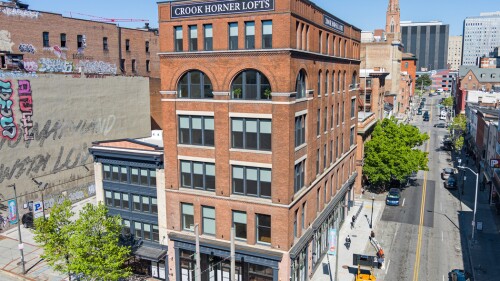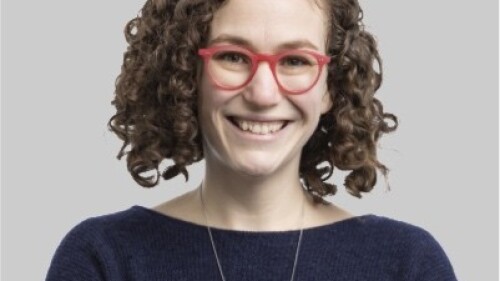
Environmental organizer Karen Blondel, with the Fifth Avenue Committee and the Gowanus Neighborhood Coalition for Justice, speaks at the organizations’ press committee with Councilmember Brad Lander (center right) to announce their demands for a socially and environmentally just rezoning process for the Gowanus neighborhood of Brooklyn, New York. (Photo courtesy of the Fifth Avenue Committee/Paula Vlodkowsky)
Location: Brooklyn, New YorkFor More Information: www.fifthave.orgInterview With: Michelle de la Uz, Executive Director
Type of Organization: Nonprofit comprehensive community development organization and NeighborWorks American member founded in 1978 whose mission is to advance economic and social justice by building vibrant, diverse communities where residents have genuine opportunities to achieve their goals as well as the power to shape the community’s future.
How does the Fifth Avenue Committee’s mission relate to the built environment and land use?
Fifth Avenue Committee (FAC) is a nationally recognized community development corporation that works to transform the lives of more than 5,500 low- and moderate-income New Yorkers annually so that we can all live and work with dignity and respect while making our community more equitable, sustainable, inclusive, and just. To achieve our mission, FAC develops and manages affordable housing and community facilities, creates economic opportunities and ensures access to economic stability, organizes residents and workers, offers student-centered adult education, and combats displacement caused by gentrification. Many of our grassroots organizing campaigns focus on the intersection of racial, economic, and climate justice, which often involves the built environment and land use. A current example is FAC’s work in regard to the city of New York’s proposal to rezone the Gowanus neighborhood of Brooklyn. Gowanus is home to New York City’s first U.S. Environmental Protection Agency (EPA) Superfund site, and there are many brownfield sites within a stone’s throw of three deteriorated public housing developments that are home to more than 4,000 low- and moderate-income New Yorkers, most of whom are people of color.
How do you define environmental justice in your work?
Environmental justice is the fair and equal treatment of all people and all communities. Certain communities—often poor and working-class communities of color—have been targeted to receive or live with environmental pollution while others have received environmental benefits. FAC recognizes that climate change affects low- and moderate-income communities of color disproportionately and that, in our society, there are intersections among environment, health, race, and power. We focus not only on the degradation of nature but also on the degradation of communities and barriers to economic self-sufficiency and the ability to build wealth for families.
How would you describe your experiences working with the real estate sector, and what do you hope to see in the future, especially given the current increased awareness of racial and environmental justice?
FAC has many experiences working with the real estate sector, both as partners to advance specific projects or policies that promote inclusion, sustainability, and resilience in New York City—and as opponents to the real estate sector when it acts irresponsibly or without consideration and accountability to the local community, especially regarding local low- and moderate-income communities of color.
Due to COVID-19 and the renewed fight for racial justice making it painfully obvious, FAC hopes that the real estate sector fully acknowledges that we are all interconnected and that only by truly taking care of each other can we truly take care of ourselves and our society as a whole.
How did you begin working with community members on climate justice issues? And how has your work changed given the many urgent community needs in the pandemic?
FAC began working with community members on climate-justice issues first through an economic justice lens when we launched Ecomat, a nontoxic green dry-cleaning business in the late 1990s. The social-purpose business had a double bottom line: to provide a green, nontoxic nonpolluting alternative to dry cleaning while also providing family-supporting jobs for individuals with barriers to employment such as histories of incarceration or homelessness. FAC’s climate justice work is a natural outgrowth of serving the people and communities of south Brooklyn. FAC serves many coastal communities; our office is one block away from New York City’s first U.S. EPA Superfund site—the Gowanus Canal—and we work in communities with a concentration of brownfield sites, waste transfer stations, and elevated highways immediately adjacent to homes. As an owner and manager of affordable housing and a community-based organization in Brooklyn, FAC has been on the front lines serving thousands of families during many climate events, including Super Storm Sandy and various heat waves and electrical outages.
FAC’s work serving over 5,500 low- and moderate-income New Yorkers annually is more essential than ever because of the pandemic. COVID-19 has laid bare the systemic inequalities that have existed in our society of generations. FAC is focused both on immediate emergency needs that exist for families who have been directly affected by COVID and have lost jobs and income as well as ensuring a just recovery for all from this global pandemic.
Tell us about your partnership with ULI New York and your work on urban heat island effects in the context of a local rezoning. Do you think a partnership like that could work in other communities?
FAC, and the community coalition we helped to found, the Gowanus Neighborhood Coalition for Justice (GNCJ), have partnered with ULI New York as part of our efforts to advance economic, environmental, and racial justice as part of the Gowanus area–wide rezoning. ULI helped organize a fantastic technical assistance panel (TAP) focused on urban heat island effects in the neighborhood and made specific recommendations that could be applied to the neighborhood rezoning. The recommendations in the report published in January 2018, A Vision for a Greener, Healthier, Cooler Gowanus: Strategies to Mitigate Urban Heat Island Effect, have been incorporated into the GNCJ’s platform, demands, and priorities and inform our coalition’s advocacy and organizing efforts. [ULI members can find that report and more through Knowledge Finder.]
The partnership grew from there, with the Urban Land Institute’s New York District Council and Urban Resilience Program collaborating with the New York Institute of Technology (NYIT) and the Urban Climate Change Research Network (UCCRN), FAC, and local community leaders and stakeholders to conduct an Urban Design Climate Workshop (UDCW) in Gowanus, which sharpened our advocacy to create New York City’s first eco-district.
The partnership that FAC has with ULI can absolutely work in other communities. The key ingredients are engaged and knowledgeable local residents and stakeholders who are willing and able to share their lived experience and expertise with the professional experts that ULI brings. By recognizing and combining the community’s expertise with the ULI member’s expertise, the recommendations and actions coming out of the partnership advance climate, land use, and community goals simultaneously.
ULI Member Perspective: Exploring Issues of Environmental Justice and Land Use

